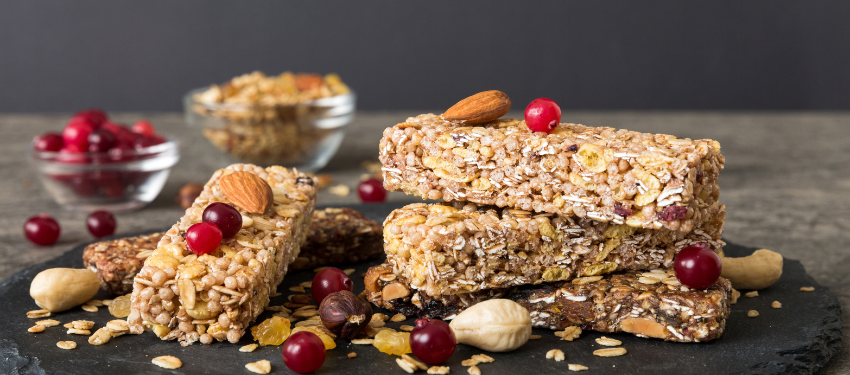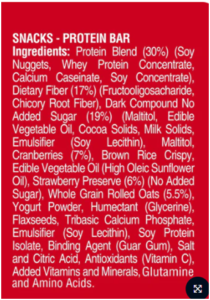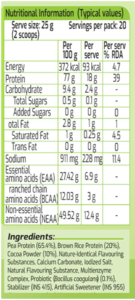NutriBars Decoded: Making Informed Choices

As I navigated the bustling supermarket aisles, my attention was drawn to the vibrant array of NutriBars lining the shelves. Each bar boasted enticing claims, from “high protein” to “low sugar”, but the sheer variety and conflicting messages left me feeling overwhelmed. One bar touted its all-natural ingredients, but it had a 16 grams of sugar per serving. Another claimed to be a “meal replacement,” but its nutritional profile resembled a candy bar more than a balanced meal. The confusion was palpable, and I knew I wasn’t alone in this dilemma. With so many options to choose from, how could one make an informed decision about which NutriBar was truly the healthiest? This article discusses NutriBars in detail and offers some tips to make healthier and better choices
Richa Pande
NutriBars offer a convenient and nutritious solution to fuel your busy lifestyle. These portable snacks are packed with wholesome ingredients that provide essential nutrients for sustained energy and overall well-being. NutriBars are typically made with a combination of whole grains, nuts, seeds, fruits, and sometimes added protein or fibre. These ingredients provide a balance of carbohydrates, protein, healthy fats, and fibre, keeping you satiated and energized throughout the day.
Different Names! Are they all same?
- Energy Bars: Designed to provide a quick and sustained boost of energy, these bars are typically high in carbohydrates. They often include a moderate amount of protein to support muscle recovery and may contain electrolytes to aid in hydration. Energy bars are ideal for pre-workout fuel, mid-activity energy boosts, or post-workout recovery.
- Meal Replacement Bars: Intended to serve as a balanced and convenient meal replacement, these bars offer a more comprehensive nutritional profile, providing a balance of macronutrients, including carbohydrates, protein, and healthy fats. They often contain a higher protein content to promote satiety and muscle maintenance, along with fibre for digestive health and sustained energy. Meal replacement bars are suitable for on-the-go meals, or individuals seeking a calorie-controlled option.
- Pre-Workout Bars: Designed to provide a pre-workout energy boost and support muscle preparation, these bars typically contain a balance of carbohydrates, protein, and healthy fats. They often include ingredients like branched-chain amino acids (BCAAs) to reduce muscle fatigue and promote muscle recovery. Pre-workout bars are ideal for consuming 30-60 minutes before exercise to enhance performance.
- Post-Workout Bars: Formulated to aid in muscle recovery and replenish glycogen stores after a workout, these bars typically have a higher protein content to support muscle repair and growth. They may also include carbohydrates to refuel muscles and promote energy balance. Post-workout bars are best consumed within 30-60 minutes after exercise to maximize recovery benefits.
Navigating the world of NutriBars can be difficult, given the vast array of options available. To make informed choices and maximize the benefits of NutriBar consumption, consider these essential tips:
Know Your Goals
Before diving into the world of NutriBars, it’s crucial to establish your primary objective for consuming them. Are you seeking a quick energy boost to fuel your active lifestyle? Aiming for sustainable weight loss by choosing low-calorie and satiating options? Or striving for muscle gain by incorporating protein rich NutriBars into your diet? Understanding your specific goals will guide your NutriBar selection and optimize their effectiveness. You can consult a registered nutritionist / dietitian for guidance.
Check the Ingredient List
Pick bars that have ingredients like whole grains, nuts, seeds, and dried fruits. These ingredients offer a wealth of nutrients and fibre, promoting overall health and well-being. Avoid NutriBars laden with excessive added sugars, artificial sweeteners, and food additives that can detract from their nutritional value.
Protein Content
Pick NutriBars with a protein content of at least 8-15 grams per serving. Protein plays a pivotal role in satiety, muscle growth, and post-workout recovery. Consuming adequate protein helps you feel fuller for longer, supports muscle maintenance and repair, and enhances athletic performance. You can pick bars that contain soy, pea, and whey, nuts and seeds.


Fibre Rich
Seek NutriBars containing at least 3-5 grams of fibre per serving. Fibre serves as a gut health champion, promoting digestive regularity, fostering the growth of beneficial gut bacteria, and contributing to prolonged satiety. Incorporating fibre rich NutriBars into your diet can help you feel fuller for longer, regulate bowel movements, and support overall digestive health. Consider NutriBars enriched with prebiotics, such as chicory root inulin or Fructooligosaccharides (FOS). Prebiotics act as food for beneficial gut bacteria, promoting their growth and enhancing digestive health. Prebiotic-rich NutriBars can help improve nutrient absorption, boost immunity, and support overall gut microbiome balance.
Sugar Content
Be mindful of sugar content when choosing NutriBars. Opt for options with less than 10 grams of added sugar per serving to minimize sugar intake and prevent blood sugar spikes. Excessive sugar consumption can contribute to weight gain, energy crashes, and increased risk of chronic health conditions.
Moderation is the key
While NutriBars offer convenient nutrition, it’s essential to have them in moderation. Mindless overconsumption of any food, including NutriBars, can lead to excess calorie intake, hindering health goals and potentially contributing to other health concerns.
